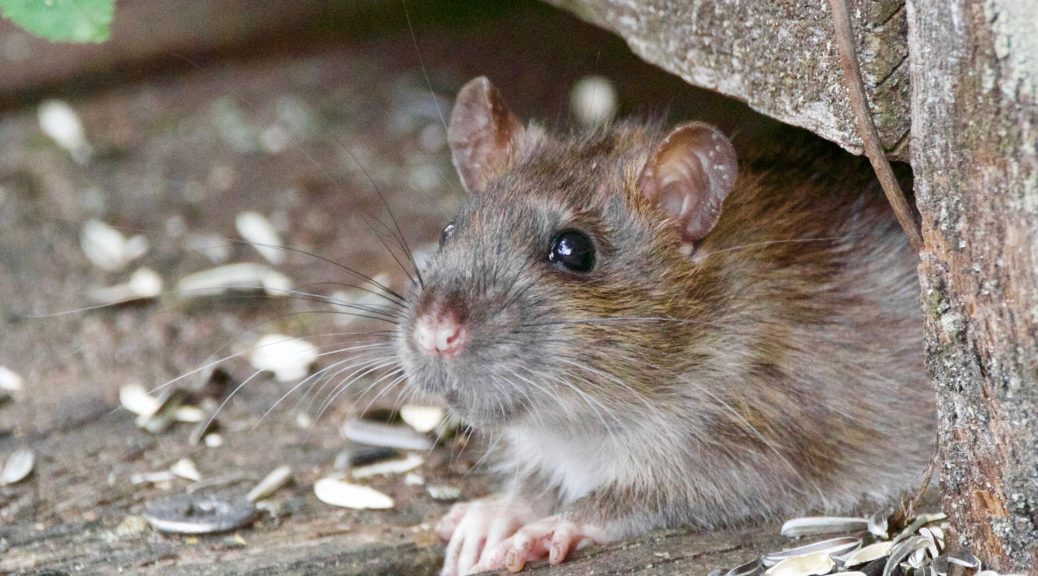Did you know that rats can produce as many as 7 litters per year, which means up to 84 offspring? When you consider that a single rat can deposit 30 to 180 droppings per day, that’s a great reason all by itself to rat-proof your property!
Rats are being reported in communities throughout the interior. Unfortunately, the species is migrating and spreading throughout all communities. Rats love places with water, food, and shelter. Rats can spread diseases to your pets and damage insulation, siding, wallboard, and electrical wiring.
Signs That You May Have a Rat Problem
There are some tell-tale signs that you may have a rodent problem:
- Rodent droppings – check the size to determine if they belong to mice or rats
- Chew marks on wood or food and around pipes
- Greasy or dirty rub marks along baseboards or floor molding
- Noises in walls or attics
How to Rat-Proof Your Property
You can help keep these pesky rodents at bay by following these steps:
- Use live or snap traps rather than rodenticide to avoid harming other animals
- Regularly inspect inside and outside of your property for rodent droppings, burrows, and rub marks along baseboards, floor moldings, and walls
- Inspect, repair, and seal any openings where a rat may enter a building on your property using durable materials such as ½” wire mesh – bear in mind that rats can squeeze through very small holes
- Install weather stripping around windows and doors, as well as door sweeps
- Remove sources of food by keeping garbage and compost inside of tightly-closed containers
- Keep pet and bird seed stored in bins
- Remove all dropped or rotten fruit from trees quickly
- Store produce in a refrigerator or secure room that has heavy wire screens on vents open to the outdoors
- Compost organic waste in sturdy, closed bins – don’t put meat scraps or bones in compost bins
- Make sure bird feeders are kept away from buildings and seeds don’t spill onto the ground
- Remove sources of water by repairing leaky plumbing and removing standing water
- Clear clogged gutters
- Remove water that may collect at the bottom of garbage cans and other bins left outside
- Remove hiding places near buildings like firewood and equipment
- Prune back branches that overhang eaves and roof areas
- Remove shrubbery, bushes, and shrubs from within 1 metre of the exterior walls of buildings to eliminate hiding spots
- Do not pile grass clippings under shrubs or trees
- Trim back vines, which can be used as “runways” by rodents
Frequently Asked Questions
Q. Have rats been reported in other communities?
A. Yes, rats have been reported or caught in most, if not all, other communities in the interior. This includes Salmon Arm, Vernon, Armstrong, Revelstoke, Sicamous, Chase, Kelowna, Kamloops, and rural areas in regional districts. This is an infestation that is spreading across a very large geographic region.
Rats do not understand jurisdiction and they tend to “travel” on vehicles and breed quickly once they have found a suitable new home with available food, water, and shelter.
Successful rat control initiatives involve making property less-inviting to rats by removing sources of food, water, and shelter.
Q. My neighbour’s property is unclean or unsightly. Is that the source of the rat problem?
A. It is a common misconception that rats are attracted to unclean properties. Rats do not distinguish between clean and unclean properties. Rats seek food, shelter, and water. These things are readily available on properties that are well-maintained. In fact, some of the features of a well-maintained property can inadvertently contribute to the rat infestation. A bird fountain or feeder, a vegetable garden, decorative vines, flowers, a hot tub, shrubbery, mulch, an unclosed compost bin, or an attic with an unprotected vent are among the many rodent attractants that people would not normally associate with an unclean or unsightly property.
For this reason, the best approach is to provide public education, as property changes and maintenance, including ongoing and regular inspections, are the most successful methods for discouraging rats.
Q. My neighbour has a rat problem. Can the City do something about this?
A. If there is evidence that a pest problem is originating from a particular property, the City will work with the property owner to resolve the issue. However, rat infestations do not tend to originate from a single property. Instead, they spread over all properties where water, food, and shelter exist.
If a rat problem appears to be related to property maintenance, or to the maintenance of a property’s adjacent boulevard, laneway, or sidewalk, the City can take action under its Good Neighbour Bylaw to require the property owner to clean the property of filth, leaves, rubbish, discarded materials, weeds, and garden or vegetation waste. As mentioned above, these are not the only sources of rodent attractants; even well-maintained properties can attract rats.
Q. What are local governments in other communities doing?
A. Nearly all local governments are focusing on public education. Rat problems can be very specific to individual property characteristics, and it is not possible to regulate a prohibition on all forms of rodent attractants, as this would include things like bird feeders, gardens, and so forth. If a property is unsightly, we already have and do use our bylaw authority to address those issues, and this also may help to address some – but not all – rat habitats.
Q. I want to address this problem on my property. What can I do?
A. In addition to the steps listed above, you can hire a professional pest control company. A professional pest control company has experts who will perform a specialized assessment on your property (inside and outside), give you recommendations on changes or maintenance, and start a “rat control program” that is usually 60-90 days in length, which involves ongoing removal and reinspection during the program’s duration. It is important to follow the changes and maintenance recommendations made by a professional pest control company, as this will help prevent rats from re-entering your property. As rats breed very quickly, they will soon re-occupy places where there are sources of food, water, and shelter.
Last Updated on December 2, 2021.


